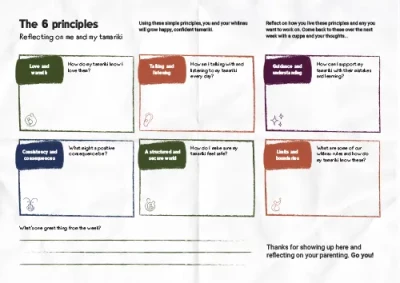
Ngā tohu whānau
Exploring positive parenting approaches at different stages of children's development.
Learning goals
- Build the confidence and ability to parent positively.
- Use a fair and firm approach to parenting.
- Understand the difference between discipline and punishment.
Explore ngā tohu whānau stages
‘Ngā tohu whānau’ are based on the Tākai ‘6 principles’.
You’ll find ‘Ngā tohu whānau’ in all the Whakatipu booklets, and how they’re relevant to each stage of a child’s development.
Choose a ‘Ngā tohu whānau’ section. Have your group consider the tohu at this stage, along with what’s covered in ‘Pēpi says’, ‘Whānau say’ and ‘Ngā taonga tākaro’ (in the same section).
Here’s an example from Te Pihinga 1:
- Pēpi says: ‘I know the familiar faces in my world really well now’ (page 25).
- Whānau say: ‘We love playing with our pēpi and it helps pēpi learn about trust’ (page 26).
- Ngā taonga tākaro: 'When pēpi is playing on the floor, encourage them to reach for things. This builds strength and develops their hand-eye coordination' (page 32).
- Ngā tohu whānau: ‘Consistency and consequences – Help pēpi build trusting relationships with a few key people' (page 17).
Can you see the connections? Depending on the size of your group, you could have participants work in small groups on different ages and stages.
Explore what other links participants find. Ask them to think about things they do with their pēpi that show:
- love and warmth
- talking and listening
- guidance and understanding
- limits and boundaries
- consistency and consequences
- a structured and secure world.










